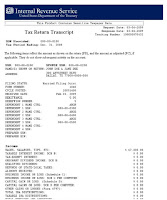 On July 24, 2018 we posted Understanding IRS Tax Audits - Part I where we discussed that careful advance preparation can help reduce the scope of a tax audit or examination and can lead to a more favorable outcome. Although a thorough understanding of the underlying facts and applicable law is a must, understanding IRS procedures is critical to preserving a taxpayer’s rights.
On July 24, 2018 we posted Understanding IRS Tax Audits - Part I where we discussed that careful advance preparation can help reduce the scope of a tax audit or examination and can lead to a more favorable outcome. Although a thorough understanding of the underlying facts and applicable law is a must, understanding IRS procedures is critical to preserving a taxpayer’s rights.
Understanding IRS Tax Audits - Part II
We have summarize below and in Parts I & III some of the more important IRS procedural rules and guidelines governing civil IRS examinations and audits, including: how returns are selected for examination; a brief description of the types of civil examinations; an explanation of the tools available to IRS examining agents and revenue agents; dispositions in IRS audits or examinations and, if necessary, where to seek relief from an unfavorable result in an examination or audit.
Interacting with the IRS Agent When possible, the taxpayer’s representative, not the taxpayer, should interact with the agent. Indeed, in most cases, the meetings should take place at the representative’s office, not the taxpayer’s place of business. Direct contact between the agent and the taxpayer (or taxpayer’s employees) should be minimized. Agents are trained in interviewing techniques designed to elicit information. They will ask open ended questions, and will listen carefully to the responses. Taxpayers who meet with an agent should be careful to answer only the question asked.
When possible, the taxpayer’s representative, not the taxpayer, should interact with the agent. Indeed, in most cases, the meetings should take place at the representative’s office, not the taxpayer’s place of business. Direct contact between the agent and the taxpayer (or taxpayer’s employees) should be minimized. Agents are trained in interviewing techniques designed to elicit information. They will ask open ended questions, and will listen carefully to the responses. Taxpayers who meet with an agent should be careful to answer only the question asked.
Absent having been served an administrative summons, a taxpayer has the right to refuse to be interviewed. Although, historically examining agents have been reluctant to press for taxpayer interviews, examining agents have become more aggressive in seeking taxpayer interviews and using summonses to compel them. If interviewed pursuant to a summons or otherwise, the taxpayer has a right to counsel and may assert appropriate privileges.
Care should be taken to create a complete record of all information provided to the examining agent. Maintain a detailed record of all documents and records provided to the examining agent. Maintain a record of any oral communication with the agent whether in person or by telephone. Confirm any material oral agreements in writing.
How Agents Gather Information
During the examination, the agent may request various types of documentation to verify items of income and expense on the return, including records, such as receipts, invoices, books, and worksheets. Revenue agents may also review prior or subsequent tax returns or the returns of related taxpayers.
Generally, agents have broad powers to compel production of relevant information. Nevertheless, certain types of information may be subject to privilege or otherwise not subject to compelled production. Once provided, the privilege is likely to have been waived. For example, an agent may ask to see invoices to substantiate a deduction claimed for professional services, such as accounting or legal fees. The descriptions of the services provided could contain information leading to another adjustment. If the descriptions of the services may be privileged, the taxpayer may be able to withhold the actual invoices in favor of some other proof of payment, or may be able to provide redacted invoices.
There has been much discussion about whether tax work papers can be so compelled. Tax work papers prepared in connection with the preparation of the tax return can be reviewed. However, audit accrual work papers, which may reflect opinions and estimates related to questionable items on the return, present a more complex question. Agents are cautioned in the Internal Revenue Manual to exercise restraint in this area, but the Service is becoming more aggressive, particularly where listed transactions are involved.
Keep in mind that the taxpayer’s books and records may contain confidential information of another taxpayer, such as IP or the terms of a contract. The taxpayer may be under a contractual obligation to keep this information confidential. If the agent can not be convinced to accept redacted documents, the taxpayer may want to decline to produce the document unless an administrative summons is issued compelling its disclosure.
An agent will typically request documents and other information by issuing an Information Document Request (Form 4564). Initial requests at the beginning of an examination are typically fairly broad with subsequent requests focusing on specific issues. Keep careful track of IDR requests and items produced. Always maintain a duplicate copy of any documents that are provided and include a transmittal letter with any response describing the documents produced.
 If a taxpayer fails to produce requested items, the Service can summons a taxpayer or third party for books, records or testimony. Agents are directed to make an attempt to obtain information informally before issuing a summons. Agents are instructed to consider issuing a summons when a taxpayer fails to make requested records available within a reasonable period of time; where the records submitted are known or suspected to be incomplete and the examining agent believes that additional records containing relevant and material matter may be in the possession of the taxpayer or a third party; and when the examining agent is in doubt as to the availability of pertinent records and wishes to obtain oral testimony as to what records may exist and their location.
If a taxpayer fails to produce requested items, the Service can summons a taxpayer or third party for books, records or testimony. Agents are directed to make an attempt to obtain information informally before issuing a summons. Agents are instructed to consider issuing a summons when a taxpayer fails to make requested records available within a reasonable period of time; where the records submitted are known or suspected to be incomplete and the examining agent believes that additional records containing relevant and material matter may be in the possession of the taxpayer or a third party; and when the examining agent is in doubt as to the availability of pertinent records and wishes to obtain oral testimony as to what records may exist and their location.
When an administrative summons is issued, the summoned person must personally appear at the time and place specified with any requested items. The summoned person has the right to counsel, the right to assert the attorney-client privilege, and the right to raise the self-incrimination privilege under the 5th Amendment. The IRS can issue administrative summonses to third parties believed to hold relevant information. Notice of summons issued to a third party must be given to the taxpayer within 3 days of the date on which service is made to the third party and no less than 23 days before the summons return date. This is to allow the taxpayer sufficient time to file a petition to quash.
If a summoned party ignores the summons or otherwise fails to fully comply, the Service may bring legal proceedings to enforce the summons in federal district court. A court will generally enforce a summons if there is a legitimate purpose for the examination; the information demanded may be relevant to that purpose; the information is not already in the possession of the Service; the information or document is not privileged and the Service has complied with the applicable administrative requirements of the Code and regulations.
To be continued... Understanding IRS Tax Audits - Part III
Read more at: Tax Times blog














